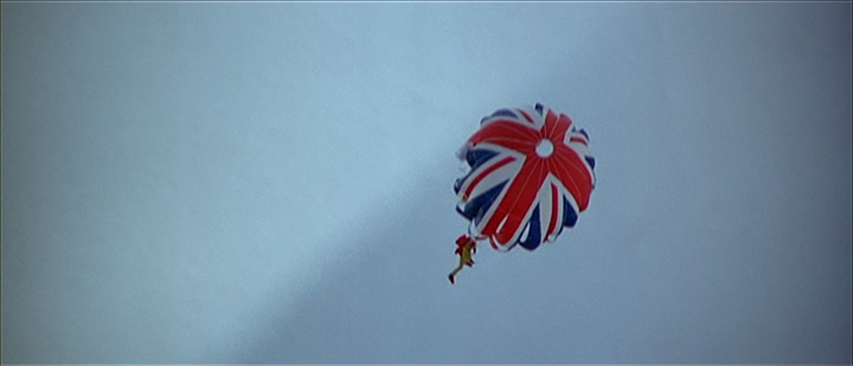Jake’s Take: One Image from The Spy Who Loved Me (Lewis Gilbert, 1977)
An image that proves one way to keep the British end up is with real stunt work.
“But James, I need you.”
“So does England.”
After the lackluster beginning of the Moore era—and the box-office drop of Golden Gun—James Bond needed a drop of another kind. Off a mountain. On skis. With a parachute. And it was exactly the drop that the series needed to rise to new heights.
Besides reminding us of the old joke about later Moore films, which star his stunt man, the image of Rick Sylvester’s amazing ski jump brings to mind two components of the franchise: the realistic spectacle of the stunt work, and the shifting notion of, as Bond quips at the film’s end, “keeping the British end up.”
The ethos of Bondian spectacle is inexorably tied to a sense of realism. Whether it is in the miniature work, the set pieces, or as it is here with the stunts, Bond films are extraordinary at making the unbelievable believable. The films aren’t always successful on this front, with some pretty awful rear projection early on and some less-than-effective efforts with CGI in the Brosnan era. There’s no substitute for the visceral impact of something “actually” happening before your eyes. In concert with this notion is a visual sensibility of letting the camera run through the course of the stunts, either with very few cuts or none at all. Think of this ski jump, or naturally the bungee jump in GoldenEye. It isn’t just the excitement of the physical act, but the revelry of the unbroken shot that captures it.
As for “the British end”, the Bond films play with the British sense of itself in a noteworthy way, with a narrowing focus over time. I’ve no doubt there are dissertations out there on the Bond films as British nationalist fantasy, and the early films in particular bear this out. Between the Americans and the Russians, the British are seen as the cool, objective moderates who will always sort out the business at hand. The opening talks in You Only Live Twice’s pre-title sequence are a fantastic example of this. In the Moore films, the Union Jack becomes a symbol of either excitement (in this shot, certainly) or light, easy humor (think of the iceberg sub hatch in A View to a Kill). In the modern era, patriotism is internalized and narrowed to become a more serious psychologically motivating force of Bond’s character. We see hints of this in GoldenEye, but Skyfall is decidedly the best example of this concept. Craig’s Bond wryly refers to his “pathetic love of country” in a faceoff with Silva, but his sarcastic comment hits us in a way that solidifies Craig’s as the most patriotic of the Bonds.
The Spy Who Loved Me puts good solid “form” back in the formula, making up for its predecessor’s many inadequacies and possessing only a few of its own (Marvin Hamlisch is no John Barry). Roger Moore has finally shown up to play, seeming like a whole new—and more confident—Bond. Barbara Bach gives a mostly excellent turn as Bond’s opposite number in the KGB, though she is far more interesting before she succumbs to Bond’s charm. Ken Adam and cinematographer Claude Renoir put a well-deserved visual polish on the film. And Lewis Gilbert finally got to make a better version of his first Bond outing. In the ever invaluable The James Bond Bedside Companion, Raymond Benson cites an article from Bondage Magazine where the similarities between The Spy Who Loved Me and You Only Live Twice are extensively charted. Too many to list here, suffice to say it is hilarious how many there truly are. But The Spy Who Loved Me is You Only Live Twice done right.
The Spy Who Loved Me reminded audiences that even with past missteps, nobody does it better than 007.
Rankings
2. On Her Majesty’s Secret Service
5. From Russia with Love
7. Thunderball
9. Goldfinger
10. Dr. No
12. The Spy Who Loved Me
17. You Only Live Twice
20. Live and Let Die
22. Diamonds Are Forever
23. The Man with the Golden Gun
JAMES BOND WILL RETURN IN MOONRAKER.
